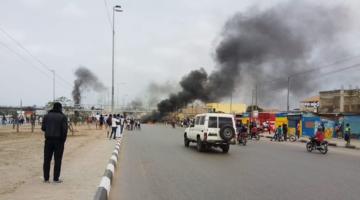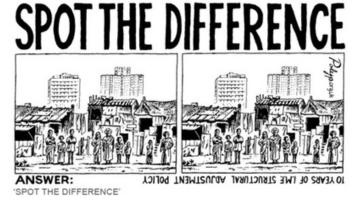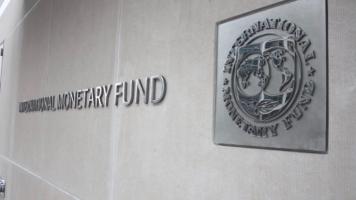Residents loot a warehouse in Nigeria's Federal Capital Territory. Photo: Vanguard
President Bola Tinubu’s lifting of fuel subsidies and liberalization of currency trade has pleased the IMF and increased hunger in Africa’s most populous country.
Originally published in People's Dispatch.
With hunger now affecting nearly half the population, Nigeria has witnessed a wave of looting of food grains from trucks and warehouses across the country over the last few weeks.
In Akure, the capital of Ondo State in the southwestern region, petty traders, drivers, artisans and other residents forced themselves on to a truck on the Ondo-Akure expressway on April 1 and looted the grains it was carrying in cartons branded with President Bola Tinubu’s name.
A day before, on Sunday, hungry residents looted rice from a warehouse in Kara Market of Birnin Kebbi, the capital of Kebbi State in Nigeria’s northwestern region which has over 500,000 cases of severe acute malnutrition.
Noticing the bags of grains being unloaded in the warehouses, crowds had begun gathering outside in the morning. Eyewitnesses reported that police fired tear gas to disperse them, but the desperate residents refused to relent and held their ground. When two more trailers arrived to unload, they forced the police to retreat by pelting stones, climbed aboard the trucks and made away with bags of rice.
When the military was deployed to the scene, some soldiers reportedly started a fight with owners of shops around the warehouse, accusing them of participating in the looting, and shooting one of them dead with a bullet to his chest.
State Deputy Governor Umar Tafida’s spokesperson has said that “measures are being put in place by the security agencies to bring the situation under control.”
However, the security forces the government is relying on to guard food grains are by far outnumbered by the number of food insecure people, which has increased by more than 50%, from 66.2 million in the first quarter of 2023 to 100 million in the first quarter of 2024. This amounts to almost 46% of the 218 million people in the country with Africa’s largest population.
According to the UN’s World Food Programme (WFP), 18.6 million of them are suffering acute hunger, while another 43.7 million are coping with hunger levels at or above its benchmark for classification as “crisis.”
The rate at which food prices are increasing, which was already as high as almost 25% last February, had risen further to almost 39% by February this year.
The central reason for this food inflation is the removal of fuel subsidies by the government in May 2023, according to a study by economist Eric Otaokhia of Ahmadu Bello University, published in the most recent issue of the Central Bank of Nigeria’s quarterly publication.
On the heels of this move against fuel subsidies, President Bola Tinubu suspended the then-president of the Central Bank of Nigeria (CBN), who, according to Reuters, had “made it difficult for investors to take out money” from Nigeria.
Tinubu then went on to liberalize the trade of Nigeria’s currency in June 2023, bringing Naira’s value crashing down overnight by more than a third. This kneecapped the country’s capacity to import, on which Nigeria had come to increasingly depend for food since the 90s, following the first round of IMF-prescribed neoliberal reforms.
Despite its high production potential, with a 70% youth population and over 40% of its land arable, food imports have more than quadrupled in the decades since.
IMF praises the reforms causing hunger
The IMF, which had in the past complained of a loss in the “momentum” of reforms by the end of the 90s, praised these new reforms, which sacrificed Nigeria’s food import capacity right after its domestic production was further undermined by the lifting of fuel subsidies.
“President Tinubu has moved ahead with important structural reforms: removing fuel subsidies and unifying the various official foreign exchange windows,” read its statement in early February. The “new CBN team” has “demonstrated this resolve by dropping its previous role in development finance,” the IMF added with satisfaction, concluding in its assessment that “Nigeria’s capacity to repay the Fund is adequate.”
The country’s inflation had by then reached the highest in almost three decades. “No food, we are dying of hunger,” read the placards, carrying which women in Niger State’s capital, Minna, blocked a key road in protest on February 5. Police responded by arresting 25 protesters, but similar protests continued in other cities of the state.
On February 21, fish vendors in Suleja, the commercial hub of Niger state, embarked on a protest against frequent hikes in the price of frozen fish rendering their business increasingly unviable. Angry youth took advantage of the protest to block the busy Abuja-Suleja-Kaduna highway and loot the held-up trucks carrying food items.
Two days later, on February 23, seven people, including a member of the ruling All Progressives Congress (APC) party, died in a stampede in Nigeria’s commercial capital Lagos, where the Customs Service was selling rice bags confiscated from smugglers at a discounted price.
Later on February 27, thousands of workers, students, shop owners, etc took to the streets across the country, protesting against the price rise of food and other essential commodities, while the Nigerian Labor Congress (NLC) led a nationwide strike.
“We are hungry. There is nobody that doesn’t know this,” said NLC’s president Joe Ajaero. “There is no civil servant today that can afford three meals a day because of the economic hardship,” added NLC chairperson Yusuf Inuwa.
In Borno state’s capital Maiduguri, heavily armed police blockaded the march. “If organized labor is silenced, no one will remain to voice the concerns of the masses,” Inuwa had said.
The “national protests should be seen as helping to constructively manage people’s frustrations from boiling over and should not be criminalized,” said Akhator Odigie, General Secretary of the International Trade Union Confederation (ITUC)-Africa.
“A recipe for chaos and lawlessness”
With an average Nigerian worker’s monthly wage insufficient to sustain a family of three for a week, Odigie warned that the “situation is an avoidable… recipe for chaos and lawlessness.”
Sure enough, chaos and lawlessness followed. In the Federal Capital Territory (FCT), residents broke into the warehouse of the Agricultural and Rural Secretariat in Gwagwalada on the outskirts of Nigeria’s capital city, Abuja, on March 2. The police took more than two hours to disperse them, but only after they had emptied the warehouse of all the grain, leaving the building damaged.
15 were arrested, but a wave of looting followed over the next two to three days in different areas of the FCT including Abuja. Along with warehouses — both government and privately owned — residents also targeted trucks they held up in traffic by blocking roads. Such instances were also reported in other states.
FCT’s Minister of State, Mariya Mahmoud, announced that police posts would be established in every government warehouse in this territory. The military, which had also intervened to prevent looting in several areas, announced that troops would be deployed across the country to guard the warehouses of the National Emergency Management Agency (NEMA).
Military’s failure in protecting farmers has exacerbated the crisis
While taking on the role of guarding food grains, the military, however, has failed in the task of protecting farmers from attacks by gangs of bandits and armed herders, which has been forcing them to abandon agriculture in several states across the country.
At least 165 farmers have already been killed this year. Bandits have also begun levying their own taxes. In the northern region, they are reportedly charging up to a hundred thousand Nairas (about 76 USD) to simply allow the farmers to access their own farmlands during the peak seasons of planting and harvest.
In the northwestern State of Sokoto alone, farmers are estimated to have paid an estimated three billion Nairas (almost 758,000 USD) in ransom last year.
This insecurity in Nigeria’s agricultural heartland has further exacerbated hunger in the country. Nigeria’s Minister of Agriculture and Food Security, Abubakar Kyari, announced relief measures to alleviate hunger after looting in Abuja last month.
“We shall commence the distribution of 42,000 metric tons of grains, as approved by Mr. President, across the 36 states of the federation as one of the programs to be rolled out this week,” he said. “Furthermore, 58,500 metric tons of milled rice from mega rice millers will also be released into the market for stabilization.” However, it has proven grossly short of reversing the hunger spike since the “reforms” for which the IMF praised Tinubu.


















